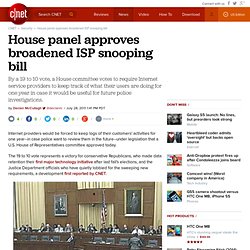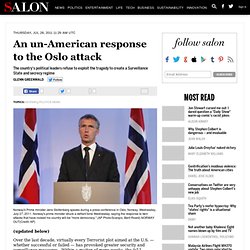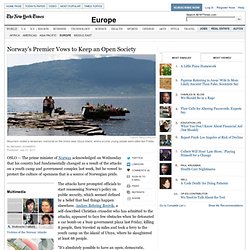

House panel approves broadened ISP snooping bill. Internet providers would be forced to keep logs of their customers' activities for one year--in case police want to review them in the future--under legislation that a U.S.

House of Representatives committee approved today. The 19 to 10 vote represents a victory for conservative Republicans, who made data retention their first major technology initiative after last fall's elections, and the Justice Department officials who have quietly lobbied for the sweeping new requirements, a development first reported by CNET. A last-minute rewrite of the bill expands the information that commercial Internet providers are required to store to include customers' names, addresses, phone numbers, credit card numbers, bank account numbers, and temporarily-assigned IP addresses, some committee members suggested. By a 7-16 vote, the panel rejected an amendment that would have clarified that only IP addresses must be stored.
"The bill is mislabeled," said Rep. April 2006: Rep. May 2006: Rep. Rep. An un-American response to the Oslo attack - Glenn Greenwald. Over the last decade, virtually every Terrorist plot aimed at the U.S. — whether successful or failed — has provoked greater security and surveillance measures.

Within a matter of mere weeks, the 9/11 attacks infamously spawned a vast new surveillance statute (the Patriot Act), a secretly implemented warrantless eavesdropping program in violation of the law, an explosion of domestic surveillance contracts, a vastly fortified secrecy regime, and endless wars in multiple countries. As it turned out, that massive over-reaction was not a crisis-driven anomaly but rather the template for future actions. The reaction to the heinous Oslo attack by Norway’s political class has been exactly the opposite: a steadfast refusal to succumb to hysteria and a security-über-alles mentality. He called on his country to react by more tightly embracing, rather than abandoning, the culture of tolerance that Anders Behring Breivik said he was trying to destroy. Multiple provisions of the U.S. Norway’s Premier Vows to Keep an Open Society. Fabrizio Bensch/Reuters Mourners visited a temporary memorial on the shore near Utoya Island, where scores young people were killed last Friday.

The attacks have prompted officials to start reassessing Norway’s policy on public security, which seemed defined by a belief that bad things happen elsewhere. , a self-described Christian crusader who has admitted to the attacks, appeared to face few obstacles when he detonated a car bomb on a busy government plaza last Friday, killing 8 people, then traveled 19 miles and took a ferry to the youth camp on the island of Utoya, where he slaughtered at least 68 people. “It’s absolutely possible to have an open, democratic, inclusive society, and at the same time have security measures and not be naive,” Prime Minister told reporters in Oslo. “I think what we have seen is that there is going to be one Norway before and one Norway after July 22,” he said.
Mr. The police have come under fire for the seemingly slow pace of their response. Mr.